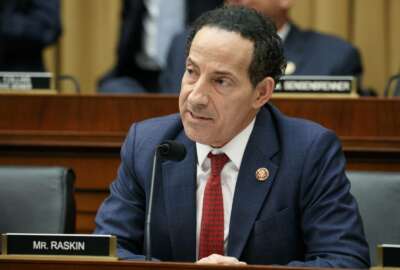
Lawmakers push to eliminate ‘mandatory’ from payroll tax deferral
In today's Federal Newscast, lawmakers say they're ready to work with the four major federal payroll providers so they can implement an option.
To listen to the Federal Newscast on your phone or mobile device, subscribe in PodcastOne or Apple Podcasts. The best listening experience on desktop can be found using Chrome, Firefox or Safari.
- Members of Congress made yet another plea for an opt-out option in the president’s upcoming payroll tax deferral. Rep. Jamie Raskin (D-Md.) and 10 other House Democrats from the National Capital Region said they have heard from concerned constituents about the mandatory policy. They said federal employees should choose whether they opt in or opt out of the payroll tax deferral. The lawmakers say they’re ready to work with the four major federal payroll providers so they can implement an option.
- The president’s latest pick to lead the Office of Personnel Management got his day before a Senate nominating committee. John Gibbs mostly got questions about his past record and rhetoric, not his plans to be OPM’s third director in as many years. On his social media posts Gibbs said, “That is something that is behind me. That is not my current role. I can assure you that I have led in a nonpartisan fashion over the past three years in my service in the government. If confirmed as OPM director, I’ll continue to lead in a nonpartisan fashion.” (Federal News Network)
- The Secret Service is bringing in some expertise to help it fight the growing problem of cyber crime and cyber fraud. The service launched its first-ever investigations-focused advisory committee, called the Cyber Investigations Advisory Board. The board will include senior executives and experts from industry, government, and academia and will provide outside strategic direction to help identify the latest trends in cyber crime, technology, law and policy. It also will offer expert guidance as the Secret Service modernizes its training, partnerships, and investigative priorities.
- Sixteen mission-critical systems face major challenges to modernize. Agencies continue to struggle to use basic IT project and program-management processes, especially with large-scale, high-risk IT initiatives. The Government Accountability Office found workforce issues, technical challenges, schedule slippages, inadequate funding and budget constraints are putting these projects at risk. A majority of the programs say they face workforce issues including contract transitions, inadequate skill among contract staff, or delays in onboarding contractor and federal support. At the same time, agencies told GAO that 13 of 16 projects have moved to an agile or iterative development approach and seven will fully deploy new capabilities in the next two years.
- The Army Corps of Engineers used a revised approach to one of its most important disaster relief missions. The new procedures were all in use as the Corps covered blown away roofs in Lake Charles, Louisiana with blue tarp. The Corps’ regional commander, Maj. Gen. Diana Holland, said that with online or telephone help sign-up, the Corps can respond to home and building owners faster and with less paperwork. To save staff field time, verification inspections are now done by a contractor using satellite imagery — no more time-consuming door-to-door inspections.
- The Defense Department is expanding its artificial intelligence cooperation internationally. The Pentagon will pair up with more than 10 other countries to focus on incorporating ethical principles into the use of artificial intelligence and warfare. Defense Secretary Mark Esper said the United States will work with other nations to create new frameworks, tools for data sharing and technologies to strengthen the ways weapons communicate. Earlier this year, the Defense Department adopted a set of ethical AI principles that include minimizing bias and having transparent methodologies.
- The Army is standing up a new organization to redesign its financial management systems. The new group, called the Enterprise Business System Multi-Functional Capabilities Team, reached initial operating capability this week. It is co-chaired by the Army’s chief financial officer and the commander of Army Materiel Command. The overall objective is to re-imagine how the Army’s financial and business processes work. The scope includes new IT systems and policy, and a new approach to personnel management in the Army financial community. (Federal News Network)
- The Office of Personnel Management said the annual employee viewpoint survey is back on starting next week. OPM delayed the Federal Employee Viewpoint Survey multiple times over the course of the spring and summer, but now says it will send the survey out in two waves starting Sept. 14. Acting OPM Director Michael Rigas said the agency spent the summer streamlining the survey to respond to agency requests. The upcoming survey will also include a section on how employees are responding to the pandemic. All employees are eligible to take the survey.
- The Postal Service received the go-ahead to raise commercial package rates ahead of its peak holiday season. The Postal Regulatory Commission has approved a temporary surcharge that will go into effect Oct. 18 and ends Dec. 27. The rate increase will not affect retail package prices. The Postal Service requested this temporary price increase in response to a surge in online shopping and package volume during the coronavirus pandemic.
- The State Department is accepting applications for its two-year Foreign Affairs Information Technology Fellowship Program. The program looks to diversify the ranks of IT specialists serving in the Foreign Service and seeks fellows who represent underrepresented demographics. Undergraduate students entering their junior year or graduate students entering a two-year master’s degree program are eligible to apply. After completing the program, the 15 fellows receive an appointment in the Foreign Service as an Information Management Specialist. The application closes in February.
- The Defense Department and the National Governors Association are working together to help states realize more value from their defense assets. The two-year cooperative agreement will help states develop and execute strategic, evidence-based action plans for promoting the defense industry. NGA and DoD’s Office of Economic Adjustment will release seven reports that provide policy analysis on how state and territorial leaders can enhance their role in national defense and realize economic benefits from it.
- The inspectors general at 15 departments have agreed to formally review their agency’s reopening plans during the pandemic. Rep. Gerry Connolly (D-Va.) had asked the IGs at the 24 largest agencies to investigate reopening and reentry plans. Seven other IGs did not agree to a formal investigation, but say they are working on some sort of review of their agency’s plans for the workforce during the pandemic. The Small Business Administration and the Department of Housing and Urban Development either didn’t respond or didn’t agree to a review.
Copyright © 2024 Federal News Network. All rights reserved. This website is not intended for users located within the European Economic Area.
Peter Musurlian
Peter Musurlian is a producer at Federal News Network.
Follow @PMusurlianWFED
Related Stories
Related Topics
Army Corps of Engineers
disaster response
Federal Employee Viewpoint Survey
Financial Management
Foreign Affairs Information Technology Fellowship
Gerry Connolly
Government Accountability Office
John Gibbs
Office of Personnel Management
payroll tax deferral
Postal Service
satellite imagery
Secret Service
State Department





